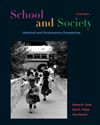 |  School and Society: Historical and Contemporary Perspectives, 4/e Stephen E. Tozer,
The University of Illinois, Chicago
Paul C. Violas
Guy Senese,
Northern Arizona University
Social Diversity and Differentiated Schooling Today: Vocational and Liberal Ideals
Professional Vocabulary- career education
- A term popularized in the early 1970s to break down the distinction between vocational and general or liberal education by asserting that all forms of education are preparation for careers of some kind; the idea failed to obscure the reality that vocational education is preparation for specific occupations and liberal education is education for more general intellectual development.
- general academic track
- The "middle" ability group or "track" that emerged in 20th century schools between the academic or college preparatory track and the vocational track.
- general education
- Broad education across the major domains of mathematics and science, social sciences, and humanities to produce a well-educated person in a nonspecialized sense.
- heterogeneous grouping
- The practice of placing children with different academic skill levels in the same group for purposes of instruction (as opposed to homogeneous grouping).
- homogeneous grouping
- The practice of placing children with similar academic skill levels in the same group for purposes of instruction (as opposed to heterogeneous grouping).
- labor market
- The totality of jobs for which people may offer themselves for employment; the labor market for physicians in typically more limited than the labor market for fast-food workers.
- liberal education
- Historically, the education appropriate to a free person; typically construed today as a broad, general education that equips a person to think well in a wide range of domains and to know at least one discipline in depth.
- service occupations
- The fastest-growing sector in the late 20th-century and early 21st-century labor market in terms of the total number of jobs; usually refers to relatively low-skill, low-pay jobs providing services to others, such as domestic labor and food service.
- tracking and detracking
- Tracking refers to the practice of "ability grouping" students by skill differences in schools for the purposes of instruction and preparation for different academic and occupational futures; detracking is the effort to resist such grouping of students.
- trivium and quadrivium
- The seven basic liberal arts disciplines of the medieval university; includes the trivium of grammar, rhetoric, and logic and the quadrivium of arithmetic, music, geometry, and astronomy.
- vocational education
- The policy and practice of providing experiences that prepare people for specific occupational futures; historically implemented at the expense of a more general or liberal education that develops a range of intellectual capacities for a wide variety of political, personal, and occupational possibilities.
|
|



 2002 McGraw-Hill Higher Education
2002 McGraw-Hill Higher Education